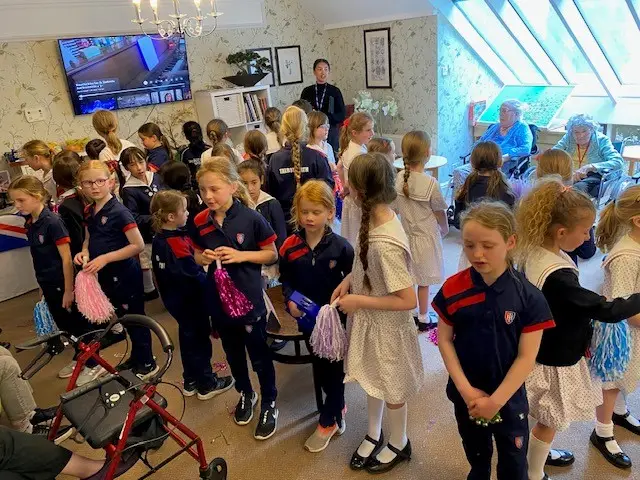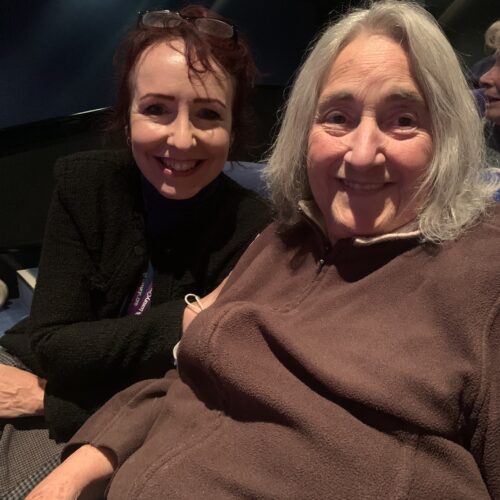Music is often the background to life; whether you have the radio on in the car, bop along to it in the supermarket or have it on in the kitchen while cooking, you are always making memories to a beat. In later life, this can become an incredibly powerful tool with some unsuspecting benefits.
For those living with dementia or suffering from memory loss, music often triggers positive emotions and memories, and it provides a form of communication that can be used by those who have lost that ability.
At LuxuryCare, we incorporate music therapy as part of our dementia care plans and activities programme. Often using it as a technique to help our residents reach their personal goals while having some fun. In this blog, we discuss the benefits of music therapy for dementia.
What Is Music Therapy?
Music therapy is when a trained professional uses music to facilitate communication and help an individual or group to express themselves.
Often, it is used as one type of therapy within dementia care, working to improve or maintain cognitive functions such as thinking, feeling, perception, mood and behaviour.
Within a care home, this can look like a group activity based around music or one-to-one sessions where the music sets the tone for a specific activity – maybe it is recreating a moment experienced between two people or simply rediscovering a passion.




How Does Music Therapy Work?
No matter your age, music activates multiple areas of the brain. Widespread activation like this can support and enhance cognitive abilities.
Moreover, music can directly access the emotional centres of the brain. This can make it easier for people suffering from dementia to connect with and express emotions that they might find challenging to verbalise otherwise.
Finally, it promotes neuroplasticity in the brain. This is where the brain makes new connections and networks between neurons and the progression of dementia. This process slows down, making it harder to make the connections, which, in turn, removes other abilities, such as communication and memory recall. Music engages the brain, stimulating neuroplasticity.
Benefits of Music Therapy for Dementia Patients
The benefits of music therapy for dementia patients are numerous and span almost every aspect of living.
Cognitive Benefits
Music, especially songs that were part of your loved one’s life in the past, will often help with memory recall. Melodies can trigger and can bring a memory to the forefront of your loved one’s mind, helping them recall it along with some details.
Also, it is often found that regular music therapy helps improve your loved one’s attention span and focus. This is because listening to music or creating music requires concentration. This skill, like many others, needs to be practised in order to be maintained. The more this skill is used, the longer better they will be at it.
Emotional Benefits
We have all used music to shift our mood from a downward spiral into something a bit happier, and it can do the same for those living with dementia.
Music can evoke emotions, so music therapy can be used to help improve and manage mood swings; upbeat music can lift a mood, or calming music can reduce anxiety or frustration.
Meanwhile, music can also reduce stress as it can lower stress hormone levels, creating a calmer feeling within your loved one and a calmer atmosphere.
Social Interaction
For those who have lost verbal communication, music can help them find a way to communicate and express emotions.
Additionally, music therapy can be done in a group, which encourages social interaction between members of the group too. Singing, playing instruments, or even just listening together can create a sense of community and reduce feelings of isolation.
These benefits not only help the ability to socialise but could also lead to reducing their feelings of loneliness.
Physical Benefits
Playing instruments or moving to music requires motor skills and coordination. Similar to attention span and focus, the more these skills are used, the longer they will remain and the slower the degeneration of these skills will be. This could help keep your loved one more independent for longer.
Not to mention that the small amount of movement is a gentle exercise for your loved one, promoting physical activity.
Behavioural Improvements
Because music can be used to help improve mood, boosting it or calming it, the frequency and intensity of aggressive behaviour or agitation can be reduced. This is for many reasons, as the music helps them express themselves, allowing their frustration to be communicated rather than built up.
Finally, it can increase the quality of sleep, reducing restlessness because it can create a peaceful and relaxing environment to sleep in.
Music Therapy At LuxuryCare
Whether your loved one joins one of our care homes for residential care, nursing care, respite care, palliative care or specialised dementia care, they will likely participate in our music therapy sessions.
We include group sessions as part of our activities programme, which everyone is welcome to join in with, even when with us for day care.
As we create bespoke care plans for all our residents, we set individual targets and goals. This could be simple things such as maintaining balance or attention span. Because of its many benefits, we will often include music therapy as part of your loved one’s care, using it as an exercise to work these skills and monitor progress or deterioration.
Music therapy often creates a fun and excitable atmosphere in our homes, reflecting how much the residents enjoy it.
We are always happy for you and your loved one to join one of our sessions when visiting us. In doing this, you can see the benefits of music therapy for dementia and experience how we include it in our care.
Discover more about our music therapy and book a visit today by calling us on 01202 037373 or completing our online contact form.

















